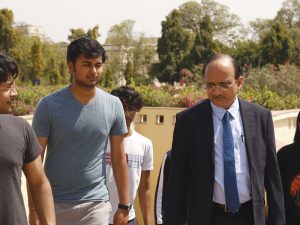21 Higher education leaders racing to develop india’s high-potential human resource: V. Ramgopal Rao
V. Ramgopal Rao
Vice Chancellor, BITS-Pilani

An engineering postgrad of Kakatiya University, Warangal and IIT-Bombay with a doctorate in nanoelectronics from Bundeswehr University, Munich (Germany), V. Ramgopal Rao is Group Vice Chancellor of the Birla Institute of Technology & Science (BITS), Pilani, which has five campuses sited in Pilani, Hyderabad, Goa, Dubai and Mumbai.
Major institutional goals for India @2047. At BITS Pilani, we have set a clear goal — to be numbered among the top 100 institutions globally in research impact and innovation-led education by 2047. Our vision includes tripling our Ph D output, integrating experiential learning into every academic programme, and designing campuses that function as innovation districts. We are investing in people, infrastructure and partnerships to ensure that every student learns by doing, every faculty member engages in meaningful research, and every campus becomes a hub for problem-solving with global relevance and local impact. Expansion, Excellence and Equity will drive our future trajectory.
Progress evaluation. Progress is quite satisfying. BITS Pilani incubated startups have touched a combined valuation of US $1 billion (Rs.8,606 crore). Over the past year, we have launched an innovation and startups policy, expanded faculty recruitment significantly, built strong alumni engagement models, and initiated one of the most comprehensive curriculum overhauls countrywide. We are also ramping up Ph D fellowships through our endowment and are forging new industry-linked research programs. And this is only the beginning.
In a country experiencing rapid transformation, we believe universities must move from incremental change to structural reform. Our systems are evolving and the direction is right, but there is still a long way to go.
Academia-industry and business linkages. Our connect with industry is deep in some areas but has potential for more strategic alignment. The Practice School program at BITS Pilani, which includes over 500 corporate partners, is a model of academy-industry integration. BITS is a pioneer in Work-Integrated-Learning Programmes with over 40,000 working professionals from hundreds of industry sectors registered for BITS Pilani degrees or certificates. We are now extending this to research collaboration, startup incubation, and faculty consulting.
Our alumni, many of whom lead large companies and unicorns, are also engaging more actively with our campuses. However, Indian industry still spends very little on R&D. For universities to become true innovation partners, we need policy nudges that incentivise India Inc to co-invest in knowledge creation.
Institutional response to R&D and innovation. We are rebuilding our R&D ecosystem bottom-up. BITS Pilani has launched a Ph D DRIVE initiative to attract endowment-supported doctoral scholars. Our campuses are establishing collaborative research centres, attracting young faculty with start-up grants, and investing in labs focused on national missions — from semiconductors to sustainability. We are also promoting a culture of research-linked entrepreneurship. Our incubators now support startups emerging directly from faculty and Ph D research, with some already securing global patents and funding. Creating new knowledge must go hand-in-hand with project implementation. That’s our focus.
Prescription for transforming India into a $30 trillion GDP economy by 2047.
India’s growth to a $30 trillion economy will depend on how quickly we transition from a low-cost service to a high-value knowledge economy. This transformation needs substantial investment in education, research, and skilling. We need thousands of job creators not only job seekers. Strengthening Tier-2 and Tier-3 HEIs, integrating vocational and formal education, and focus on sunrise sectors such as AI, climate tech, and electronics manufacturing is critical. We must also encourage risk-taking in research and innovation by reducing regulatory burdens and autonomy for institutions that demonstrate outcomes.
India@100 is a collective project. It cannot be achieved by government or industry alone. HEIs must play a leading role, not just in producing skilled graduates, but in shaping narratives, building institutional excellence and solving real-world problems. Universities must measure success not just in terms of placements and rankings, but in terms of how many lives we have touched, how many problems we have solved, and how many innovations have emerged from our labs. If we shift the focus from quantity to quality, and from form to substance, India can emerge not just as an economic power, but as a global leader in ideas and innovation.
Also Read: BITS Pilani students in Goa develop solution to screen radical content online

















Add comment